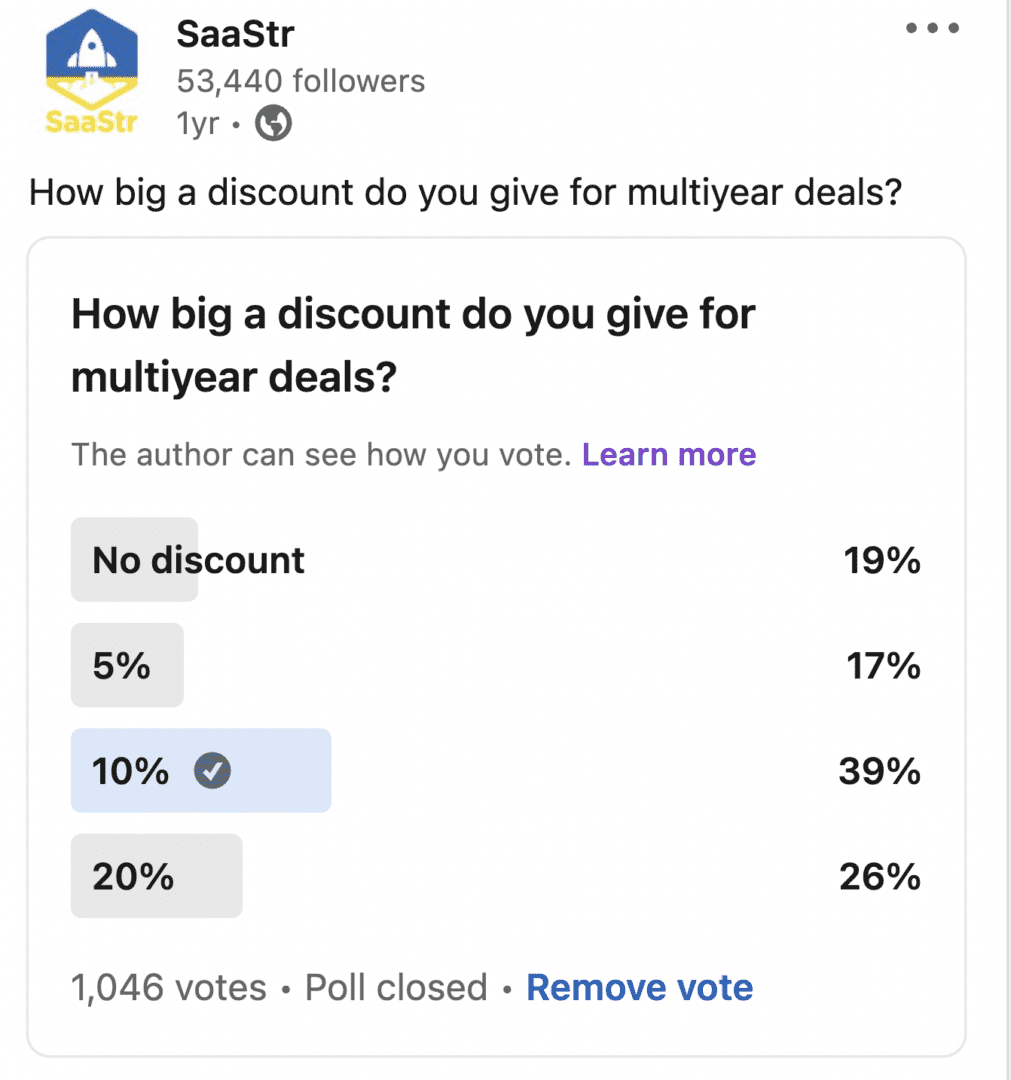I’m not that great at sales myself (not really), but I am a student of it.
A few things I’ve observed about human behavior, negotiation, and good and bad sales processes in SaaS:
- Customers that expect a discount really expect a discount. It’s generally easier to mark up the pricing a bit, then discount — than hold the line. The amount of energy it takes to stick to a “no discounts” policy once you pass transactional pricing is … high. Once you are in “Contact Me” land, just assume you have to provide some sort of discount. So increase your prices accordingly so you land where you need to end up.
- Context is critical. It saves a lot of time if a prospect knows that pricing is fair. Transparent pricing on your website has pros and cons for bigger deals, but it does save a lot of time. So consider making as much pricing transparent as possible if you do smaller deals as well as larger ones, and/or if you want the fastest sales cycles. Simple, clear calculations of pricing also help a lot. No one wants to be ripped off. And having context helps a prospect figure out what is fair, much faster.
- Urgency is a critical part of a salesperson’s toolkit. And this is a tough one to master. One of the top ways to drive up sales is to increase the % of deals that close. And one of the top ways to do that is to close deals faster. That takes risk out of deals. But in reality, there’s little urgency for most buyers. The world won’t end if I wait a quarter to buy your SaaS product. But the best sales leaders still find a way to create that urgency, through adding value, getting trials going, discounts, offers, services, etc. A related post here.
- If a prospect inbounds and already knows a lot — it’s your deal to lose. So, be cool. If a prospect comes in, already knows your product and has smart questions on how to deploy it — don’t blow it. That deal has a very high chance of closing. Don’t play games. Don’t send break-up emails if the deal doesn’t close in a week. Mediocre sales reps bring the wrong tools into deals. Very high-quality leads should be nurtured especially thoughtfully. They will close. If not this week, then at some point. And if you blow it — they will go to your competitor. Don’t blow it.
- In SaaS, buyers expect sales to be their allies and ambassadors. Not used car salespeople. SaaS buyers expect sales to answer their questions, figure out how best to use the product at their company, etc. They expect sales to do a lot of heavy lifting for them in the discovery and value-identification process. If the rep provides tons of value upfront, and the pricing is fair and has context, the prospect generally will then buy. But many reps get this wrong and immediately go into deal dynamics, pushing price, discounts, and expiring offers. That’s wrong. Most SaaS products are not commodities. It matters far less if I pay $18k or $22k for a mission-critical piece of software, than that I know it will really work well for me.
- If you show small customers as much love as large customers, magic happens. It is natural for reps to spend more time on bigger deals, with bigger commissions, etc. But in fact, buying decisions are often harder on small companies. They don’t have IT departments, CIO offices, or even a person just to manage software purchases. If you are talking to the CEO of a prospect, then you know it’s very important to her — and that she just doesn’t have enough time to play games. If you can find a way to treat small customers with the same love and attention as large ones, magic happens. Because they pay out of their own pockets. And they don’t have enough internal resources to smooth through bumps or jump through hoops.


